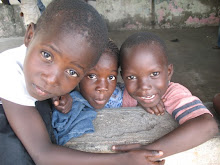
A strange and unusual and wonderful day in James Town with the visit of 20 young people from Base 33, a youth project in Witney, Oxfordshire. The group, visiting Ghana for 10 days, had met Patrick, Owusu and Eric from Theatre for a Change in the UK and now wanted to come and see TfaC in action.
They arrived at the Community Theatre Centre in the baking early afternoon sun, attached to tiny cheeky kids from across James Town who had joined them en route. They were early; our team of performers were late. Johnson improvised and - particularly as he was leading his first ever workshop with a group of young people from the UK - did incredibly well to keep everyone involved and participating.
By the time we'd learnt names, sung a Ga song, been taught 'Happy and you know it' by the UK group and talked a little about TfaC's work in HIV/AIDS prevention, the performers had arrived. They are all from the 'advanced group', made up of some of the facilitators and long-standing members of the community theatre.
I was curious about the performance: how well the CTC guys would be able to perform using English rather than Ga, how well the UK young people would respond to the themes and ideas. I was apprehensive as to whether any of them would be confident to step up and use 'touch tag' to join in the piece after it had been performed the first time round.
I needn't have worried - the young people were an attentive audience, the performers were generally pretty clear and kept the piece (about a girl infected with HIV and the way those closest to her stigmitise her) flowing really well. And then, after initial shyness, two of the UK girls stepped onto the stage and replaced 'Tracy', the protagonist, suggesting different ways that she could have dealt with the situation she found herself in.
What was most heartening for me was the response afterwards of the UK young people: not only did they ask lots of thoughtful, insightful questions but they responded to the issues raised in a very personal way, relating the messages and lessons learned back to their own lives rather than seeing them as relevant only to James Town or Ghana - or, for that matter, Africa.
At the end of the piece I interviewed three of the girls and they spoke about how having HIV shouldn't change your personal relationships: "you can't just drop your friends because they have a disease, it doesn't make them a different person" - a lesson that young people in Ghana take from TfaC's performances too.
It was inspiring watching the TfaC guys welcome the young people from the UK and put on such a confident, relevant performance. And it was inspiring seeing how positively the young people reacted - and how clearly interested they were in the issues.
On a personal note, it felt a little as if my work in the UK had collided unexpectedly with my work here. It was fascinating, and heartening, to see how well they combined.












